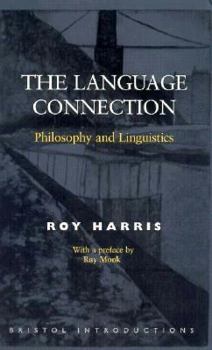The Language Connection: Philosophy and Linguistics
Why have philosophers and linguists in the West always failed to agree about language? How can we use language to talk about language? Is the division between the disciplines of philosophy and... This description may be from another edition of this product.
Format:Paperback
Language:English
ISBN:1855064987
ISBN13:9781855064980
Release Date:January 1996
Publisher:St. Augustine's Press
Length:193 Pages
Weight:0.72 lbs.
Dimensions:0.6" x 5.4" x 8.5"
Related Subjects
Language ArtsCustomer Reviews
1 rating
Review of Harris, The Language Connection
Published by Thriftbooks.com User , 23 years ago
Review of Harris, The Language ConnectionWhile I was reading this book and becoming more exasperated by the minute, I learned that Roy Harris had referred to Chomskyan linguistics in a 1997 publication as "cloud-cuckoo-land," and I felt justified in being nearly as coarse myself at the outset of this review. But by the end of the book one finds that Harris is perfectly sane. After all, his earlier work was eminently sensible and even long overdue; I think especially of _The Language Myth_ (1981) and _Reading Saussure_ (1987). What Harris lacks is not sanity nor even brilliance, but simply knowledge of, or even distanced respect for, that concern of philosophy known as metaphysics. Although Anglo-American philosophy has labored long under the illusion that metaphysical questions can be treated as language questions (and thus join or at least sidle up to the natural world as "observables"), this has turned out to be a failure, and it is this failure that Harris unknowingly explores. Firmly seated in the house he is burning down, Harris regularly uses the term "metalinguistics" where we expect "metaphysics" and uses the latter term only in its all-too-modern dyslogistic sense, taking it to mean something like "mysticism."Here is Harris's position in a nutshell (and if it seems a bit sophomoric in the nutshell version you are welcome to buy and read the book). Speech is a human activity, wherein real speakers say real things to each other in various real contexts. But over the last 2500 years, both grammarians/linguists and philosophers have treated a language as a system which exists "all by itself," a system which speakers "use" when they produce speech. Thus the grammarian/linguist has his "words" and "sentences" and the philosopher has his "terms" and "propositions." This is what Harris calls "the segregational approach" to language -- language "decontextualized" -- and in his view we should get rid of it, or at least be aware of the "metalinguistic illusions" into which it leads us. The segregational approach, according to Harris, is historically due to the reification of linguistic objects as an educational strategy by grammarians and philosophers in order to stake out domains of inquiry. Thus it is both contingent and "parochial" in origin, and therefore quite arbitrary.At the end of Chapter 4 Harris writes: "the use of metalinguistic predicates like `true' and `false' (or their relatives in other languages) does not reduce to a simple matter of assessing whether what someone says is the case actually is the case. For that way of putting it already assumes that what is the case is independently given." (Well, yes.) He adds, "And that too is a metalinguistic presupposition." It is, of course, a metaphysical presupposition.Probably Harris's most provocative remark is on p 30: speaking of the shift from the grammarian's "sentence" to the philosopher's "proposition" he writes: "No theorist in the Western tradition has so far mana





